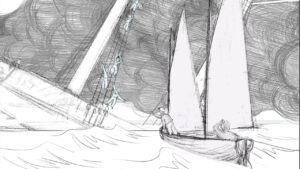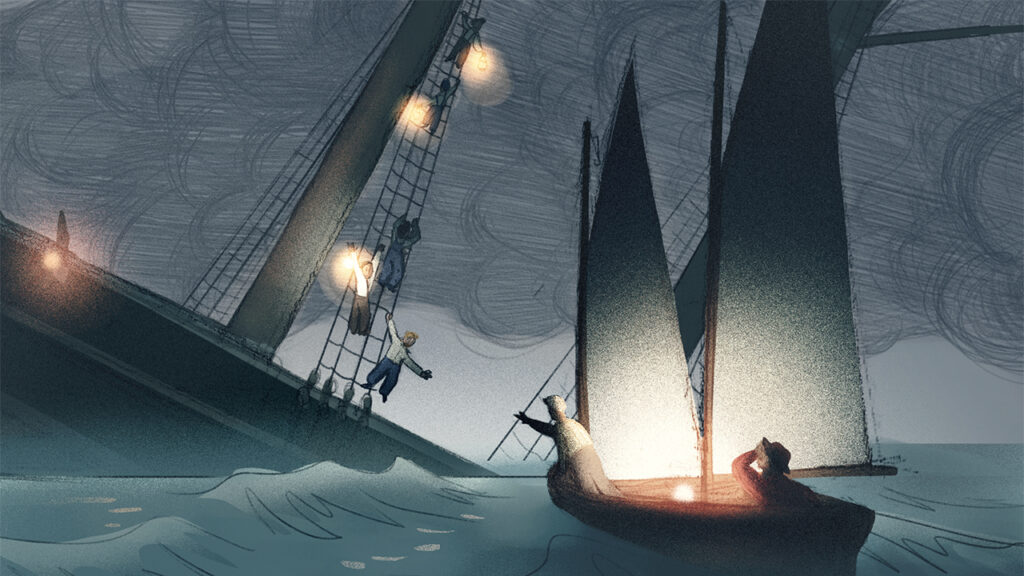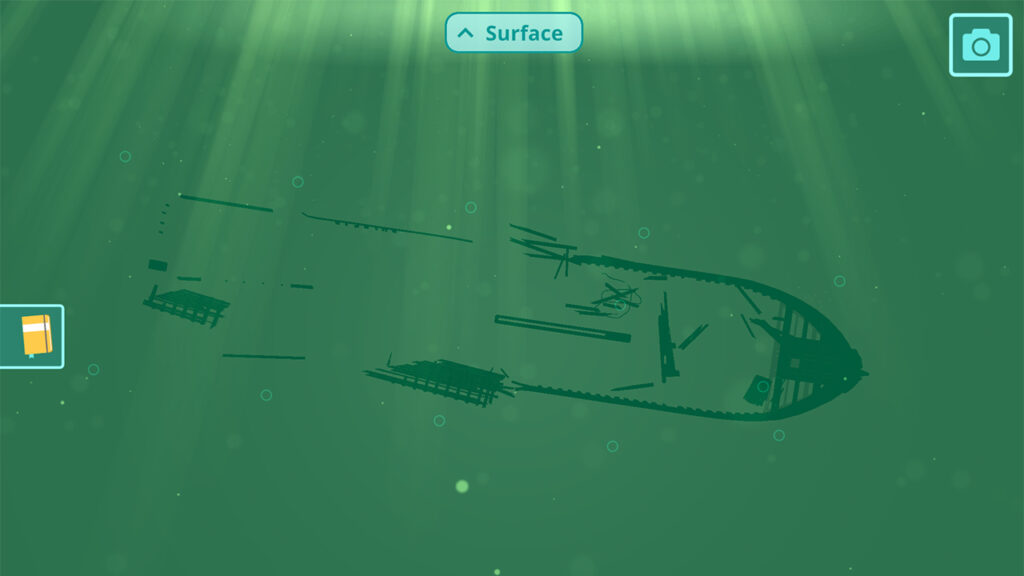Q&A: Wisconsin Teachers Talk ‘Shipwrecks!’ Game Design Fellowship
September 14, 2021 Leave a Comment
During the 2020-2021 academic year, fourteen 3rd-5th grade Wisconsin teachers took part in the Shipwrecks! Game Design Fellowship with Field Day and PBS Wisconsin Education. Educators met five times throughout the winter with a community of teachers, game designers, researchers and maritime archaeologists to co-design a video game that investigates shipwrecks in the Great Lakes using the practices of real archaeologists.

A sketch for the artwork in the game.
In addition to co-designing the game, teachers play-tested the game with their students. Students then provided feedback and suggested areas of improvement as the design team iterated designs, character artwork and game play. Field Day art designers also visited classrooms virtually to gain student feedback on character art. The Shipwrecks! game will be released this winter.
PBS Wisconsin Education spoke with two of those educators – Susan Jurries, of Arbor-Vitae Woodruff School, and Mike Scoville, of Gibraltar Area Schools – about their experience with the Shipwrecks! project.

A sketch becomes a fully painted image that players will experience as part of a short animation after completing a level.
PBS Wisconsin Education: How did you get involved in the Shipwrecks! project?
Susan Jurries: My teaching partner, Perry Smith, has done a couple of Sea Grant excursions of study on the Great Lakes. Initially, he and I both applied for the Field Day project, but they only had room for him. So, later they asked me to join to participate in the story and curriculum development of the game.
Mike Scoville: I have had the pleasure of working on Jo Wilder and the Capitol Case with Field Day, PBS Wisconsin, DPI and Wisconsin Historical Society. I knew that if they offered another fellowship, I wanted to be a part of it.
PBS Wisconsin Education: Why is Great Lakes education important to you and your students?
Jurries: I work at an Expeditionary Learning (EL) School, and we have specific design principles that guide our instruction. Some of these principles include: The Natural World, Service and Compassion, Solitude and Reflection, Competition and Collaboration, The Primacy of Self-discovery. We create expeditions that students can fully immerse themselves in. Our favorite is our Great Lakes Expedition. Another part of our expedition is based on shipwrecks of the Great Lakes. Our shipwreck portion of the Great Lakes Expedition helps us delve into the guiding questions: How are humans dependent commercially and economically on the Great Lakes? What are the effects of the human-environment interaction of the Great Lakes?
Scoville: Living in Door County, my students and I see the water everyday. Many of them spend much of their time in or around the water. We are surrounded to the west by Green Bay and to the east by Lake Michigan. Although there are many teaching points with maritime archeology and history, in fifth grade there is a specific study on transportation and industrialization in Wisconsin.

Players will experience what it looks like to dive when they find the Latitude and Longitude for a wreck.
PBS Wisconsin Education: Do you feel video games are useful educational tools?
Jurries: I was recently introduced to the concept of gamification at our EL Summit. It was of interest to me because I have used games like Jeopardy! and online scavenger hunts. I created a Great Lakes shipwreck hunt for Wisconsin Sea Grant. Gaming is how the child brain works now. I figure, why fight it? Just use it to get them interested and learning.
Scoville: Video games bring a natural curiosity to students. They have great background knowledge of how video games work and are willing to jump in and work. There is natural competition to try to beat the game. Using gamification in school is a great way to include students in new and difficult learning.
PBS Wisconsin Education: What do you hope your students will gain from being part of the process?
Jurries: My hope is that they will have an enriched perspective on educational gaming and look deeper when participating in gaming.
Scoville: It is neat to see how students are connecting what we have done in social studies this year to the video game. Whether it be city locations to maritime occupations to ships and their cargo, my students are seeing the connections. I think they are also gaining useful knowledge about what is under the water that they see everyday and how dangerous everyday life was, and still is, on the water.
 Passport
Passport






Daniel Harrison says:
The virtual dive feature reminds me of one of my dream projects: embedding 3-D photogrammetry of wreck sites into a GIS-based bathymetric model. Then gamify it using a repurposed arcade machine to create the look and feel of a virtual mini-sub that can move through the digital submerged landscape, using its robotic arm to “grasp” hotlinks to information bubbles, videos, photos. Nice thing to have at a maritime museum or visitor’s center.
Unfortunately, I have absolutely none of the resources (or skills) to make this happen. But I can dream big.